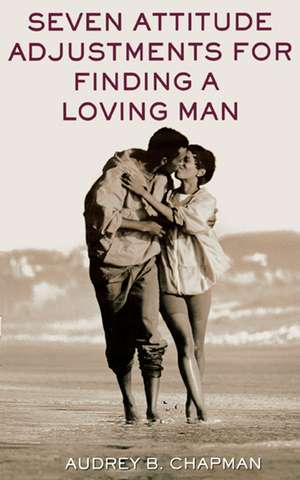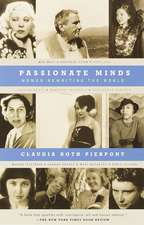Seven Attitude Adjustments for Finding a Loving Man
Autor Audrey B. Chapmanen Limba Engleză Paperback – iul 2001
Because you're so well pulled together and without a partner, you may have developed an attitude toward men. Believe it or not, men can sense what you think of them. For instance, when you meet a man do you evaluate him as a possible partner or do you think of him as a potential friend? If you become open to him as a friend you may learn something from him that will forever enrich your life. Or he may ultimately become your lifelong partner or introduce you to him. The key is openness, and you can't be receptive to love when an attitude creates a barrier around you.
Renowned relationship therapist Audrey B. Chapman identifies the subtle attitudes Black women harbor that prevent us from finding love and happiness. Without even knowing it we can be controlling, materialistic, cynical, desperate, and even hostile. Chapman shows us how to take time for ourselves -- to figure out the exact traits we're looking for in a man to enable relationships to become learning experiences, not jumping-off points for developing resentment. She tells us how to evaluate potential partners so that we don't repeat the same mistakes. She also offers insightful and refreshing tips on how to meet and marry the man of our dreams.
Preț: 112.80 lei
Nou
Puncte Express: 169
Preț estimativ în valută:
21.59€ • 23.08$ • 17.100£
21.59€ • 23.08$ • 17.100£
Carte disponibilă
Livrare economică 27 martie-10 aprilie
Preluare comenzi: 021 569.72.76
Specificații
ISBN-13: 9780743406017
ISBN-10: 074340601X
Pagini: 288
Dimensiuni: 127 x 203 x 18 mm
Greutate: 0.26 kg
Ediția:Original
Editura: Gallery Books
Colecția Gallery Books
ISBN-10: 074340601X
Pagini: 288
Dimensiuni: 127 x 203 x 18 mm
Greutate: 0.26 kg
Ediția:Original
Editura: Gallery Books
Colecția Gallery Books
Notă biografică
Audrey B. Chapman, a nationally recognized expert in male-female relationships, has appeared on Oprah, Sally Jessy Raphael, and Tavis Smiley. The host of the Audrey Chapman Show on WHUR-FM in Washington, DC, she is also a therapist in private practice in Washington and the author of four books.
Extras
Chapter One: What Makes Sisters Want To Shout?
One Saturday afternoon a month, I attend my women's book club. It never ceases to amaze me that no matter what we're reading, whether it's a novel or a self-help book, the conversation always drifts to the men in our lives.
One afternoon, we'd just finished talking about Yolanda Joe's He Say, She Say, a novel about black relationships that switches back and forth between the male and female characters' points of view. Reading about how differently the men and women viewed their relationships naturally got everyone thinking about their own situations.
"Gloria, that father really reminded me of your doggish boyfriend," said Lenore. "You know, the way he runs the streets and doesn't show up when he's supposed to half the time."
"Why are you being so hard on the brother?" retorted Gloria. "The man's just going through something!"
Sheena jumped right in: "They're always going through something! I'm sick of them! And I'm sick of sisters making excuses for their tired behavior."
"Nobody ever makes excuses for us sisters," Betti agreed. "And I think that's unfair."
"Who ever told you that life would be fair in the first place?" Hazel retorted.
"I've had some fairness in my life from some brothers," said Cassandra. "Problem is, just as I was starting to relax and enjoy it, they would always do something stupid."
"Like what, for instance?" asked Gloria.
"Like tell me that he'd just started working for some pyramid sales company and he'd be hanging out at the meetings, recruiting until about two in the morning," Cassandra explained.
Everyone roared with laughter.
"Girl, don't go for that," said Enid. "That's a highly unlikely story. Sounds to me like brotherman is just handing you a big, big lie."
"But I remember when one of our ex-club members, Jackie, was coming every month, complaining about being stood up," said Tess. "None of you ever pointed out to her that her misery was really because she chose to see a married man. No one except me ever told her that she was responsible for her own misery because she was dealing with a man who she knew was already committed."
"Why do you girls always have to talk about these men?" said Barbara. "We all know that they're hopeless. They're only good for three things: sex, carrying heavy loads, and good times. When are you all going to get smart and start taking care of yours?"
"All right, girls, I think we've gone beyond what we're here for," I cut in. "We're getting into deep water, and if we don't get back to this book, we're all going to leave here today with attitudes."
When black women share with me the stories of their frustrating love lives, they usually believe that they're telling me something new. Unfortunately, I hear similar tales of woe from virtually every new client. Over the years, I've observed that the defensive behaviors we adopt in order to live with our pain shape themselves around seven "attitudes."
Attitude One -- Rage:
"Don't even try to mess with me." "I'm angry and everybody's gonna get it!" The need to let off anger and sarcasm on any available target.
Attitude Two -- Control:
"Man, where were you last night?" The drive to control one's environment and the people in it.
Attitude Three -- Desperation:
"I'm gonna make you love me." The overwhelming need to be rescued and loved, at any cost.
Attitude Four -- Materialism:
"Ain't nothing going on but the rent." Filling an emotional void with the pursuit of platinum, BMWs, and Versace.
Attitude Five -- Mothering:
"Come to Momma, baby." The drive to nurture that masks a hidden demand to be nurtured oneself.
Attitude Six -- Shame:
"Without a man, I'm nothing." The humiliation of being single, alone in a world where everyone else seems to come in couples.
Attitude Seven -- Cynicism:
"All men are sorry." "Men ain't nothing but trouble." The insistence that all brothers are dogs and unfit for a loving, trusting, monogamous relationship.
I will explore each of these attitudes in greater detail in chapter 3.
These seven "deadly" attitudes get women through the night, so to speak, but they do not really ease the pain, and they certainly don't correct the fundamental problem. Keep in mind that whatever you put out into the world, you are certain to get back.
Once you are willing to confront the behaviors and attitudes that get you in trouble -- often without your even knowing it -- you won't need to be angry and you will no longer suffer that terrible pain. If your thinking is bound up in attitudes of fear, resentment, or cynicism, it is difficult to take a good, long, hard look at yourself. You're too busy blaming everyone else for your own mess. If you continue refusing to look within so you can examine how your own issues and decisions may be getting you into trouble, you won't change your beliefs or your patterns of behavior. In other words, you won't adjust your attitude so that when the right man does come along, you recognize him and choose to share with him a positive, loving relationship.
You may be shaking your head right now, wondering, what's the point? Is there any hope, any way out between the rock of black women's bad attitudes and the hard place of black men's bad behaviors? "Why bother to adjust my attitude?" you could be asking yourself. "A man won't change by wanting to love me anyway. What's the payoff?"
Let me assure you that the payoff for adjusting your attitude is well worth the trouble of taking a good, hard look within. Here are three good reasons you should make that adjustment:
<
"It's Saturday Night and I Ain't Got Nobody"
As the host of The Audrey Chapman Show -- a weekly Saturday-morning radio program broadcast in Delaware; Washington, D.C.; Virginia; and Maryland -- I tackle virtually all the issues that come up between black women and men. About two years ago, we aired a show entitled "It's Saturday Night and I Ain't Got Nobody," after Wilson Pickett's classic tune. We didn't think much about it, except in terms of people being home alone on Saturday night, but as soon as we announced the morning's topic, the switchboard was flooded with calls. Most of my callers are usually women, but this time, the brothers were burning up the wires, eager to express shock and dismay that so many ladies were home alone on Saturday night. In fact, we received so many calls that we had to repeat the show the following week.
The women who called my show about Saturday-night dates expressed hurt, sadness, confusion, and anger, because they didn't have a clue about how to fill their long, empty, solitary weekends. Some of those women had dropped out of the social scene because they'd never been able to get past their confusion. They gave up because they couldn't grasp why they had kept on selecting certain types of men who never worked out for them, and they'd never taken time to consider what kind of man would actually have suited them better.
I wondered how many women actually had a clear idea of what kind of man they wanted to be with on Saturday or any other night of the week. Have you taken time to think about what traits you really want in a man? Good listener, honest, reliable, etc. Sometimes, a good place to begin getting clear about what you want in a man is to make a list of ten or more traits you know you definitely do not want. List those traits here:
Traits I Don't Want in a Man
1.
2.
3.
4.
5.
6.
7.
8.
9.
10.
Now, you are ready to make up a list of ten or more traits you do want in a man:
Traits I Do Want in a Man
1.
2.
3.
4.
5.
6.
7.
8.
9.
10.
If your lists are too long for these pages, write them on a separate sheet of paper. Make sure to keep them handy. After you finish reading this book, check your lists again to see if you want to make any changes. Notice those changes. These lists will help provide you with a new awareness so that you can distinguish between what you think you want in a man and what traits are really best for you.
Making these lists will also help you to become more selective during the dating process. Immediately, you will recognize a man who seems to have the qualities that you desire.
It seems that more sisters than ever are singing the lonely-lady blues. Studies confirm that the numbers of unmarried black adults -- males and females -- is at an all-time high. A 1999 report put out by the Morehouse Research Institute, Turning the Corner on Father Absence in Black America, found that 70 percent of black children are now born to single black mothers. Linked to that dismal statistic is a divorce rate that is currently nearly twice as high in the black community as the white. According to Professor Larry Davis of the Research Institute, two out of every three black marriages end in divorce, compared to one in every two white marriages. In 1970, the U.S. Census Bureau found one unmarried couple living together for every one hundred households with married couples. Today, the Census Bureau reports that the figure has soared to eight unmarried partners for every one hundred who are married. Based on surveys conducted in 1997, the bureau states that "nearly 35 percent of Americans aged twenty-five to thirty-four have never been married. Among African-Americans, the figure is 54 percent." Other studies find that black women who divorce are unlikely to marry again.
So, Daddy's not at home. He's having children without getting married, or he's getting divorced twice as frequently as three decades ago, and the pool of single black women who will never marry is larger than ever before in American history. In other words, we now have the perfect situation to ignite widespread panic and desperation in black women of all ages. Even if a sister married at twenty years old or so and later divorced, by the time she hits her midforties, she's been "out there" for about two decades. By then, the pickings look mighty slim. Many men are in committed relationships, and some men are gay and don't relate to women romantically. Others relate only to women of other ethnic and racial groups. Yet another group has an addiction problem or is incarcerated, under- or unemployed, or has deep-seated issues about women that make them poor candidates for permanency.
All this sparks a second rush of desperation. "I'm getting older," a woman thinks. "Now there's even less to choose from!" No wonder so many black women are weighted down by a deep sense of hopelessness, frustration, and depression that's so often masked by the outward facade of an angry attitude. More often the anger is a protective defense to cover up sadness and deep longing.
Black women feel cheated. They want to build and sustain romantic relationships with black men, yet it looks to them as if the relatively few brothers who are "marriage material" resist this prospect in every way that they can. Some black women even believe that black men just don't like them. At the very least, they sense that many black men don't want to relate to them in a serious way and that brothers have virtually opted out of marriage and commitment.
The Sisters' Blues Ain't Like Everyone Else's
According to the American Psychological Association (APA), women are more susceptible to depression than men because they are less likely to feel in control of their lives and more likely to dwell on their problems. Unfortunately, more sisters are depressed than in other groups of women.
The National Mental Health Association states that almost 50 percent more black women experience depression than do women of other races. Studies also find that black women are more often subject to the many stress factors that lead to depression: poverty, sexual or physical abuse, discrimination, loss of employment, crime, violence, and the death of a loved one. Those findings are backed up by the March 6, 1999, issue of Advance Data, a publication put out by the U.S. Centers for Disease Control and Prevention (CDC).
In his Washington Post column published January 19, 1999, titled "The Happiness Study," African-American writer Courtland Milloy cites the CDC's conclusion that black women experience "bad feelings" at a rate three times as high as white men. In fact, according to the CDC, black women are the least happy people in America.
Milloy writes that he was so shocked by these conclusions that he took to the streets to conduct his own informal survey to match his own data to the CDC's findings. After presenting the scientific findings to random sisters and receiving universal "So, what else is new?" reactions, one woman finally laid it out for Milloy: "Of course we are the most unhappy. We are women and we are black." Another woman worked with a team of black men at BET TV. She stated that the male workers there often dragged their heels, forcing the women to shoulder most of the workload. This made those sisters not only unhappy in love but also miserable throughout each day of the work week.
"Could it be that black women actually are being treated worse than any other group?" Milloy speculates. He then paraphrases an anonymous black sociologist who "theorized that part of the problem may be that African-American women, as some of the most liberated and independent women on earth, unfortunately have been mismatched with some of the most sexist, insecure, and self-excusing of men."
That anonymous male sociologist's theory is supported by results from another poll of black women on the state of their love relationships that was conducted in 1993 by The Atlanta Journal-Constitution. Of the Southern black women who participated, 68 percent stated that their relationships with black men had changed over the years for the worse.
What Makes Sisters Want to Shout?
At least some of the stress factors that make sisters prone to depression and to acting out their pain and frustration through attitudes involve their difficult relationships with men. I conducted my own survey into exactly what types of male behavior trouble black women most. During a public speaking appearance, I asked the women in my audience to answer in writing, "What makes sisters want to shout?" Here are some of their answers:
These remarks make it clear that sisters are frustrated by the treatment they receive from men. And, too often, we feel that venting our pain through insults is our only salvation.
Battling between Brothers and Sisters
I received another graphic picture of the anger and pain created by the war between brothers and sisters when I delivered a talk on male-female relationships during Black History Month at Virginia's historically black Hampton University. The audience consisted of five hundred students and faculty.
I shared with my audience the results of an informal survey conducted by Indianapolis University concerning levels of trust between men and women. The survey question: When was the last time you shared a truly intimate secret with someone of the opposite sex? Only ten percent said they had ever shared an intimate secret with a partner. What did my audience think the level of trust was between Hampton's men and women? I asked.
A huge roar of laughter welled up, especially from the young men, who seemed particularly tickled by the word trust mentioned in the same breath as women. "What's this all about?" I wondered aloud. One young woman approached a microphone set up in the audience.
"You can't trust them," she said decisively. "They're all over the place with everybody on this campus."
"It's not just that we're all over," a young man countered. "Y'all make it easy!"
Those words kicked off a hot debate. Another woman jumped up to get at a microphone.
"You guys just need to grow up!" she declared.
"In what areas do they need to grow up?" I asked.
"They need to learn how to be more honest," she explained. "Why is it that whenever you question a guy about his intentions, you can't get an honest answer?"
The bickering between the Hampton women and men reflects the raging war between black women and men of all ages. We're making a big mistake if we believe the war is only between youngsters or includes merely a few individuals. In fact, we need to examine the ongoing "battling" within the context of what's going on in America overall.
Since the seventies, this country has moved steadily in the direction of disposability, superficiality, and the impersonal, "free" sex mentality that was jump-started by birth control pills, Masters and Johnson's sexuality studies, and the founding of Playboy and Cosmopolitan magazines. Whether married or unmarried, people were urged during that era to "do your own thing." A mild backlash followed the initial explosion of sexual freedom so that people were still openly sexual, but unwed mothers and unmarried cohabitation were frowned upon. Abortion became legal but remained somewhat undercover.
In the mideighties, herpes and HIV infection raised their ugly heads, so the public discourse switched to safe sex. What went missing from both eras -- the excitement of sexual freedom in the seventies and the warnings about safe sex from the eighties up to the present -- has been any talk about how to develop the insights and skills that allow people to form lasting, loving attachments. Some people today are struggling to figure out how to create families, while other families continue to fall apart as divorce becomes a more common solution to relationship problems. In addition, increasing numbers of women are choosing career over marriage.
The gap between sexual engagement and emotional commitment that first appeared in the seventies has grown into a yawning chasm. People are more disillusioned than ever over the widening separation between sex and emotional connection. In the black community especially, it seems as if men and women have never been more at odds.
An article in the February 18, 2000, issue of Hilltop, Howard University's weekly student paper, discusses a controversial interview with actor Wesley Snipes that appeared in a 1996 edition of Ebony magazine. Snipes admitted in that interview to his preference for submissive Asian women who would "give me peace in my home." Here is what the Howard student writer thinks of Snipes's choice:
Snipes' decision to eschew Black women, in favor of Asians, was based upon a long-standing trial-and-error basis -- not a knee-jerk "dark gentlemen prefer blondes motif." Snipes' decision, and every other Black man that [sic] finds love outside of boa-constrictor-like Social Hermaphrodism of Black women, deserves to be honored and respected without any mouth from the Sapphire Gestapo. Our freedom of choice is evidence of our humanity, and any white, black or female [sic] that [sic] tries to deny us our birthright as men is practicing a nuanced racism no less deadly than the Ku Klux Klan or the Nazi party.
Wesley Snipes was speaking for all Black men. What the Black man wants is respect, submission, cooperation, peace, companionship, and regular sex with a conviction to please....Slavery and our tragic history has [sic] spoiled the Black female, and she is misguided to believe that her closed-shop vaginal-monopoly over her Black brother is permanent.
Sadly, this young black male writer's list of what brothers want from sisters does not even mention "love," and the sexist, macho, and emotionally detached persona he displays in his writing is shared by too many of his peers.
In More Than Sex: Reinventing the Black Male Image, George Edmond Smith, M.D., exposes the roots of that macho, sexist, and emotionally detached persona in a deep and pervasive insecurity:
The enigma that the African-American male must solve is why must he define himself through his sexuality? Must the black man confirm his manliness by how many beautiful women he has had? More importantly, why is another person's perception so important to the black man's image? There's a deep-rooted insecurity in African-American men as the result of sexual stereotyping. If all black men have to offer is the ability to satisfy a woman, then doesn't it stand to reason that we would have to keep satisfying women sexually to prove that we have something to offer? As a result, emotions become difficult to express and men become terrified of the possibilities of rejection.
As every adult should know, sex alone can't sustain a relationship and make it last. The refusal of many black men to offer more than sex is one of the key reasons for the war between black men and women.
The Numbers Game
My friend Lorraine and I were talking one day about her divorce and all our girlfriends' discouraging romantic experiences.
"I don't know when we're finally going to realize that there's only four," Lorraine said.
"Four what?" I asked.
"Four men in the entire world who understand what relationships are all about. You gotta be lucky enough to be in the right place at the right time to meet one of the four. If you don't, you just spend all your life in search of, encountering, and being grossly disappointed."
"How discouraging this would be for so many women if they were to buy into what you're saying," I objected. "It makes the situation nearly hopeless!"
"Not if they're willing to struggle with a man. Quite frankly, I've given up the struggle. I'm just gonna love 'em and leave 'em."
Sadly, many black women agree that their sole choices are to be alone or to stay in a relationship that shortchanges their needs. Lorraine has decided that she prefers to be alone. That numbers game is distracting her -- and perhaps you -- from the reality that good men are out there, and there're more than four!
Are You a Sister with Attitude?
Is your love style getting you into emotional trouble, causing you to develop negative attitudes and to engage in behavior that sabotages your chances for a genuine love partnership?
If you want to explore this possibility and identify the thoughts and belief systems that are keeping you stuck, you first need to pinpoint your personal love style. The following questions will help you discover what behaviors may be fueling your cycle of anger, pain, shame, and fear. Check yes, no, or sometimes after each question:
1. Do you move quickly into dating situations by planning out the next several months of social events with each new man?
Yes________ No________ Sometimes________
2. Do you make excuses for a man's bad behavior and ignore the clues telling you he's emotionally or socially unavailable?
Yes________ No________ Sometimes________
3. Do you fantasize about receiving constant attention, material indulgences, and fulfillment of other needs by a particular man (or any man)?
Yes________ No________ Sometimes________
4. Do you believe that because of the male shortage, you have to accept any type of treatment from a man, no matter how degrading or insensitive, just to avoid rejection and loss?
Yes________ No________ Sometimes________
5. Do you find yourself attracted only to men who need financial and/or emotional help, especially yours?
Yes________ No________ Sometimes________
6. Do you have sex right off the bat, then assume that your time in bed means the man is seriously committed?
Yes________ No________ Sometimes________
7. Do you often find yourself getting into arguments or feeling irritated and upset over minor events and inconveniences?
Yes________ No________ Sometimes________
8. Do you refuse to attend public events by yourself, from parties to the neighborhood movie theater, because you're afraid people will think you're a loser?
Yes________ No________ Sometimes________
9. Do you renege on social commitments as soon as you meet a man, even if it means breaking a date with a female friend at the last moment?
Yes________ No________ Sometimes________
10. Do you believe that if you do everything to please a man, he will "learn to love you"?
Yes________ No________ Sometimes________
11. Do you believe that men can only offer you sex, good times, and money?
Yes________ No________ Sometimes________
12. Do you believe that because all men are cheaters, they shouldn't be taken seriously?
Yes________ No________ Sometimes________
If you answered yes or sometimes to just one question, you need this book. You may believe that your attitude doesn't need adjusting, but I invite you to read on, anyway. Our minds play games on us now and then in order to lead us away from the discomfort that often comes up whenever we confront our own truths.
Perhaps you had difficulty answering the questions clearly and honestly. In that case, skip them for now. After you've read a few more chapters, return to these pages and attempt to answer the questions again. You will find that you are better able to identify your personal love style and behavior patterns. You will begin to see ways in which you can stop these automatic ways of reacting to men and others around you.
Try to remain open. Every one of us could use a little enlightenment from time to time. These questions are a first step toward greater awareness of how what you are putting out is determining what you're getting back.
In the next several chapters, you'll learn much more about how your own defensive attitudes and misguided behaviors create your unhappiness, and you will discover ways to replace them with a more positive, empowered attitude. You will no longer see yourself as a victim. You will realize that you are capable of clear, positive choices, and you will know that you are worthy of love and appreciation. The strategies and insights you gain will divert all that energy you've been wasting on negative situations toward creating better situations that enhance your life. Most important, your focus will shift from changing the men in your life to changing yourself.
This "me first" is critical. Until you change your own approach to life and love, it won't matter what man you meet along the way. Until you put a constructive "me first" into place, you will continue to let life happen to you instead of learning how to think strategically and directing the course of your life.
That conscious "me first" will help you tap into your personal power. Later on in the book we will deal more fully with personal power and its relationship to self-awareness. You will see that once you possess the self-awareness you need in order to form positive, lasting relationships, you will become more secure and less defensive. You will take care of yourself with men, without ever becoming hostile or bitter.
I'm not guaranteeing that you will meet Mr. Right and spend the rest of your days hand in hand, walking into the sunset together. I do guarantee, though, that after you remove the blinders of your attitudes, you will see the way to lasting love far more clearly. At the very least, you will move from desperation, anger, hostility, cynicism, or shame about being alone to a more hopeful position of self-acceptance and inner peace. You will be released from your pain and open to a more self-fulfilling life.
Copyright © 2001 by Audrey Chapman
One Saturday afternoon a month, I attend my women's book club. It never ceases to amaze me that no matter what we're reading, whether it's a novel or a self-help book, the conversation always drifts to the men in our lives.
One afternoon, we'd just finished talking about Yolanda Joe's He Say, She Say, a novel about black relationships that switches back and forth between the male and female characters' points of view. Reading about how differently the men and women viewed their relationships naturally got everyone thinking about their own situations.
"Gloria, that father really reminded me of your doggish boyfriend," said Lenore. "You know, the way he runs the streets and doesn't show up when he's supposed to half the time."
"Why are you being so hard on the brother?" retorted Gloria. "The man's just going through something!"
Sheena jumped right in: "They're always going through something! I'm sick of them! And I'm sick of sisters making excuses for their tired behavior."
"Nobody ever makes excuses for us sisters," Betti agreed. "And I think that's unfair."
"Who ever told you that life would be fair in the first place?" Hazel retorted.
"I've had some fairness in my life from some brothers," said Cassandra. "Problem is, just as I was starting to relax and enjoy it, they would always do something stupid."
"Like what, for instance?" asked Gloria.
"Like tell me that he'd just started working for some pyramid sales company and he'd be hanging out at the meetings, recruiting until about two in the morning," Cassandra explained.
Everyone roared with laughter.
"Girl, don't go for that," said Enid. "That's a highly unlikely story. Sounds to me like brotherman is just handing you a big, big lie."
"But I remember when one of our ex-club members, Jackie, was coming every month, complaining about being stood up," said Tess. "None of you ever pointed out to her that her misery was really because she chose to see a married man. No one except me ever told her that she was responsible for her own misery because she was dealing with a man who she knew was already committed."
"Why do you girls always have to talk about these men?" said Barbara. "We all know that they're hopeless. They're only good for three things: sex, carrying heavy loads, and good times. When are you all going to get smart and start taking care of yours?"
"All right, girls, I think we've gone beyond what we're here for," I cut in. "We're getting into deep water, and if we don't get back to this book, we're all going to leave here today with attitudes."
When black women share with me the stories of their frustrating love lives, they usually believe that they're telling me something new. Unfortunately, I hear similar tales of woe from virtually every new client. Over the years, I've observed that the defensive behaviors we adopt in order to live with our pain shape themselves around seven "attitudes."
Attitude One -- Rage:
"Don't even try to mess with me." "I'm angry and everybody's gonna get it!" The need to let off anger and sarcasm on any available target.
Attitude Two -- Control:
"Man, where were you last night?" The drive to control one's environment and the people in it.
Attitude Three -- Desperation:
"I'm gonna make you love me." The overwhelming need to be rescued and loved, at any cost.
Attitude Four -- Materialism:
"Ain't nothing going on but the rent." Filling an emotional void with the pursuit of platinum, BMWs, and Versace.
Attitude Five -- Mothering:
"Come to Momma, baby." The drive to nurture that masks a hidden demand to be nurtured oneself.
Attitude Six -- Shame:
"Without a man, I'm nothing." The humiliation of being single, alone in a world where everyone else seems to come in couples.
Attitude Seven -- Cynicism:
"All men are sorry." "Men ain't nothing but trouble." The insistence that all brothers are dogs and unfit for a loving, trusting, monogamous relationship.
I will explore each of these attitudes in greater detail in chapter 3.
These seven "deadly" attitudes get women through the night, so to speak, but they do not really ease the pain, and they certainly don't correct the fundamental problem. Keep in mind that whatever you put out into the world, you are certain to get back.
Once you are willing to confront the behaviors and attitudes that get you in trouble -- often without your even knowing it -- you won't need to be angry and you will no longer suffer that terrible pain. If your thinking is bound up in attitudes of fear, resentment, or cynicism, it is difficult to take a good, long, hard look at yourself. You're too busy blaming everyone else for your own mess. If you continue refusing to look within so you can examine how your own issues and decisions may be getting you into trouble, you won't change your beliefs or your patterns of behavior. In other words, you won't adjust your attitude so that when the right man does come along, you recognize him and choose to share with him a positive, loving relationship.
You may be shaking your head right now, wondering, what's the point? Is there any hope, any way out between the rock of black women's bad attitudes and the hard place of black men's bad behaviors? "Why bother to adjust my attitude?" you could be asking yourself. "A man won't change by wanting to love me anyway. What's the payoff?"
Let me assure you that the payoff for adjusting your attitude is well worth the trouble of taking a good, hard look within. Here are three good reasons you should make that adjustment:
<
- Personal self-understanding. One, if you are overwhelmed by bitterness and hostility, it doesn't matter how attractive you are, how educated, how religious, how beautifully dressed, how much money you have, or how exquisite your home. None of those externals will get you what you want -- even if one hundred Mr. Rights were to turn up on your doorstep -- if all those blessings are tainted by a sour, angry, desperate, or fearful attitude. Men are equipped with built-in radar for a bad attitude, and they will take any action to avoid it. More important, attitude is everything in life. It influences all aspects of your experience and plays a huge role in your choices and what happens to you. It's pretty miserable lugging around a crusty, hard attitude that colors every aspect of your day. That bad day becomes a week, then a month, a year, a decade, until, finally, your attitude has cast a pall over your entire life.
- Living a happy life. Two, maintaining a negative attitude saps a lot of the energy you could be using to be more creative, productive, and even have more fun in your life.
- Personal growth. Three, hanging on to a self-protective but self-defeating attitude suggests that just because you can't find the man you want, life is over, a done deal.
"It's Saturday Night and I Ain't Got Nobody"
As the host of The Audrey Chapman Show -- a weekly Saturday-morning radio program broadcast in Delaware; Washington, D.C.; Virginia; and Maryland -- I tackle virtually all the issues that come up between black women and men. About two years ago, we aired a show entitled "It's Saturday Night and I Ain't Got Nobody," after Wilson Pickett's classic tune. We didn't think much about it, except in terms of people being home alone on Saturday night, but as soon as we announced the morning's topic, the switchboard was flooded with calls. Most of my callers are usually women, but this time, the brothers were burning up the wires, eager to express shock and dismay that so many ladies were home alone on Saturday night. In fact, we received so many calls that we had to repeat the show the following week.
The women who called my show about Saturday-night dates expressed hurt, sadness, confusion, and anger, because they didn't have a clue about how to fill their long, empty, solitary weekends. Some of those women had dropped out of the social scene because they'd never been able to get past their confusion. They gave up because they couldn't grasp why they had kept on selecting certain types of men who never worked out for them, and they'd never taken time to consider what kind of man would actually have suited them better.
I wondered how many women actually had a clear idea of what kind of man they wanted to be with on Saturday or any other night of the week. Have you taken time to think about what traits you really want in a man? Good listener, honest, reliable, etc. Sometimes, a good place to begin getting clear about what you want in a man is to make a list of ten or more traits you know you definitely do not want. List those traits here:
Traits I Don't Want in a Man
1.
2.
3.
4.
5.
6.
7.
8.
9.
10.
Now, you are ready to make up a list of ten or more traits you do want in a man:
Traits I Do Want in a Man
1.
2.
3.
4.
5.
6.
7.
8.
9.
10.
If your lists are too long for these pages, write them on a separate sheet of paper. Make sure to keep them handy. After you finish reading this book, check your lists again to see if you want to make any changes. Notice those changes. These lists will help provide you with a new awareness so that you can distinguish between what you think you want in a man and what traits are really best for you.
Making these lists will also help you to become more selective during the dating process. Immediately, you will recognize a man who seems to have the qualities that you desire.
It seems that more sisters than ever are singing the lonely-lady blues. Studies confirm that the numbers of unmarried black adults -- males and females -- is at an all-time high. A 1999 report put out by the Morehouse Research Institute, Turning the Corner on Father Absence in Black America, found that 70 percent of black children are now born to single black mothers. Linked to that dismal statistic is a divorce rate that is currently nearly twice as high in the black community as the white. According to Professor Larry Davis of the Research Institute, two out of every three black marriages end in divorce, compared to one in every two white marriages. In 1970, the U.S. Census Bureau found one unmarried couple living together for every one hundred households with married couples. Today, the Census Bureau reports that the figure has soared to eight unmarried partners for every one hundred who are married. Based on surveys conducted in 1997, the bureau states that "nearly 35 percent of Americans aged twenty-five to thirty-four have never been married. Among African-Americans, the figure is 54 percent." Other studies find that black women who divorce are unlikely to marry again.
So, Daddy's not at home. He's having children without getting married, or he's getting divorced twice as frequently as three decades ago, and the pool of single black women who will never marry is larger than ever before in American history. In other words, we now have the perfect situation to ignite widespread panic and desperation in black women of all ages. Even if a sister married at twenty years old or so and later divorced, by the time she hits her midforties, she's been "out there" for about two decades. By then, the pickings look mighty slim. Many men are in committed relationships, and some men are gay and don't relate to women romantically. Others relate only to women of other ethnic and racial groups. Yet another group has an addiction problem or is incarcerated, under- or unemployed, or has deep-seated issues about women that make them poor candidates for permanency.
All this sparks a second rush of desperation. "I'm getting older," a woman thinks. "Now there's even less to choose from!" No wonder so many black women are weighted down by a deep sense of hopelessness, frustration, and depression that's so often masked by the outward facade of an angry attitude. More often the anger is a protective defense to cover up sadness and deep longing.
Black women feel cheated. They want to build and sustain romantic relationships with black men, yet it looks to them as if the relatively few brothers who are "marriage material" resist this prospect in every way that they can. Some black women even believe that black men just don't like them. At the very least, they sense that many black men don't want to relate to them in a serious way and that brothers have virtually opted out of marriage and commitment.
The Sisters' Blues Ain't Like Everyone Else's
According to the American Psychological Association (APA), women are more susceptible to depression than men because they are less likely to feel in control of their lives and more likely to dwell on their problems. Unfortunately, more sisters are depressed than in other groups of women.
The National Mental Health Association states that almost 50 percent more black women experience depression than do women of other races. Studies also find that black women are more often subject to the many stress factors that lead to depression: poverty, sexual or physical abuse, discrimination, loss of employment, crime, violence, and the death of a loved one. Those findings are backed up by the March 6, 1999, issue of Advance Data, a publication put out by the U.S. Centers for Disease Control and Prevention (CDC).
In his Washington Post column published January 19, 1999, titled "The Happiness Study," African-American writer Courtland Milloy cites the CDC's conclusion that black women experience "bad feelings" at a rate three times as high as white men. In fact, according to the CDC, black women are the least happy people in America.
Milloy writes that he was so shocked by these conclusions that he took to the streets to conduct his own informal survey to match his own data to the CDC's findings. After presenting the scientific findings to random sisters and receiving universal "So, what else is new?" reactions, one woman finally laid it out for Milloy: "Of course we are the most unhappy. We are women and we are black." Another woman worked with a team of black men at BET TV. She stated that the male workers there often dragged their heels, forcing the women to shoulder most of the workload. This made those sisters not only unhappy in love but also miserable throughout each day of the work week.
"Could it be that black women actually are being treated worse than any other group?" Milloy speculates. He then paraphrases an anonymous black sociologist who "theorized that part of the problem may be that African-American women, as some of the most liberated and independent women on earth, unfortunately have been mismatched with some of the most sexist, insecure, and self-excusing of men."
That anonymous male sociologist's theory is supported by results from another poll of black women on the state of their love relationships that was conducted in 1993 by The Atlanta Journal-Constitution. Of the Southern black women who participated, 68 percent stated that their relationships with black men had changed over the years for the worse.
What Makes Sisters Want to Shout?
At least some of the stress factors that make sisters prone to depression and to acting out their pain and frustration through attitudes involve their difficult relationships with men. I conducted my own survey into exactly what types of male behavior trouble black women most. During a public speaking appearance, I asked the women in my audience to answer in writing, "What makes sisters want to shout?" Here are some of their answers:
- Men who won't commit but remain marginally in your life, swooping in to get pumped up, sexed up, and fed, then leaving you at a moment's notice.
- Being left to take care of the children -- their babies -- by yourself, without support.
- Having to be a "supermom" who does everything for everybody in the whole fucking world.
- Being afraid of being left, over and over and over again by the same damn man, just wearing different pants.
- Getting hit with their pain and anger, feeling weighted down by their contempt toward you and by their ugly, macho ways.
- Being rejected over and over by men for white, right women who hardly ever seem to measure up to our beauty.
- Falling in love with every good-looking, two-timing man who comes along.
- Feeling angry about being treated in degrading ways by sexist men who want only parts of you without taking on any responsibility or commitment.
- Feeling so used and spread out that you don't have a moment to exhale -- to breathe a little, relax a little, and enjoy the simple pleasures of life.
- Longing for his touch but unable even to get close enough to experience the scent of his body.
- Finding out that he's been sleeping around while vowing that he loves you.
These remarks make it clear that sisters are frustrated by the treatment they receive from men. And, too often, we feel that venting our pain through insults is our only salvation.
Battling between Brothers and Sisters
I received another graphic picture of the anger and pain created by the war between brothers and sisters when I delivered a talk on male-female relationships during Black History Month at Virginia's historically black Hampton University. The audience consisted of five hundred students and faculty.
I shared with my audience the results of an informal survey conducted by Indianapolis University concerning levels of trust between men and women. The survey question: When was the last time you shared a truly intimate secret with someone of the opposite sex? Only ten percent said they had ever shared an intimate secret with a partner. What did my audience think the level of trust was between Hampton's men and women? I asked.
A huge roar of laughter welled up, especially from the young men, who seemed particularly tickled by the word trust mentioned in the same breath as women. "What's this all about?" I wondered aloud. One young woman approached a microphone set up in the audience.
"You can't trust them," she said decisively. "They're all over the place with everybody on this campus."
"It's not just that we're all over," a young man countered. "Y'all make it easy!"
Those words kicked off a hot debate. Another woman jumped up to get at a microphone.
"You guys just need to grow up!" she declared.
"In what areas do they need to grow up?" I asked.
"They need to learn how to be more honest," she explained. "Why is it that whenever you question a guy about his intentions, you can't get an honest answer?"
The bickering between the Hampton women and men reflects the raging war between black women and men of all ages. We're making a big mistake if we believe the war is only between youngsters or includes merely a few individuals. In fact, we need to examine the ongoing "battling" within the context of what's going on in America overall.
Since the seventies, this country has moved steadily in the direction of disposability, superficiality, and the impersonal, "free" sex mentality that was jump-started by birth control pills, Masters and Johnson's sexuality studies, and the founding of Playboy and Cosmopolitan magazines. Whether married or unmarried, people were urged during that era to "do your own thing." A mild backlash followed the initial explosion of sexual freedom so that people were still openly sexual, but unwed mothers and unmarried cohabitation were frowned upon. Abortion became legal but remained somewhat undercover.
In the mideighties, herpes and HIV infection raised their ugly heads, so the public discourse switched to safe sex. What went missing from both eras -- the excitement of sexual freedom in the seventies and the warnings about safe sex from the eighties up to the present -- has been any talk about how to develop the insights and skills that allow people to form lasting, loving attachments. Some people today are struggling to figure out how to create families, while other families continue to fall apart as divorce becomes a more common solution to relationship problems. In addition, increasing numbers of women are choosing career over marriage.
The gap between sexual engagement and emotional commitment that first appeared in the seventies has grown into a yawning chasm. People are more disillusioned than ever over the widening separation between sex and emotional connection. In the black community especially, it seems as if men and women have never been more at odds.
An article in the February 18, 2000, issue of Hilltop, Howard University's weekly student paper, discusses a controversial interview with actor Wesley Snipes that appeared in a 1996 edition of Ebony magazine. Snipes admitted in that interview to his preference for submissive Asian women who would "give me peace in my home." Here is what the Howard student writer thinks of Snipes's choice:
Snipes' decision to eschew Black women, in favor of Asians, was based upon a long-standing trial-and-error basis -- not a knee-jerk "dark gentlemen prefer blondes motif." Snipes' decision, and every other Black man that [sic] finds love outside of boa-constrictor-like Social Hermaphrodism of Black women, deserves to be honored and respected without any mouth from the Sapphire Gestapo. Our freedom of choice is evidence of our humanity, and any white, black or female [sic] that [sic] tries to deny us our birthright as men is practicing a nuanced racism no less deadly than the Ku Klux Klan or the Nazi party.
Wesley Snipes was speaking for all Black men. What the Black man wants is respect, submission, cooperation, peace, companionship, and regular sex with a conviction to please....Slavery and our tragic history has [sic] spoiled the Black female, and she is misguided to believe that her closed-shop vaginal-monopoly over her Black brother is permanent.
Sadly, this young black male writer's list of what brothers want from sisters does not even mention "love," and the sexist, macho, and emotionally detached persona he displays in his writing is shared by too many of his peers.
In More Than Sex: Reinventing the Black Male Image, George Edmond Smith, M.D., exposes the roots of that macho, sexist, and emotionally detached persona in a deep and pervasive insecurity:
The enigma that the African-American male must solve is why must he define himself through his sexuality? Must the black man confirm his manliness by how many beautiful women he has had? More importantly, why is another person's perception so important to the black man's image? There's a deep-rooted insecurity in African-American men as the result of sexual stereotyping. If all black men have to offer is the ability to satisfy a woman, then doesn't it stand to reason that we would have to keep satisfying women sexually to prove that we have something to offer? As a result, emotions become difficult to express and men become terrified of the possibilities of rejection.
As every adult should know, sex alone can't sustain a relationship and make it last. The refusal of many black men to offer more than sex is one of the key reasons for the war between black men and women.
The Numbers Game
My friend Lorraine and I were talking one day about her divorce and all our girlfriends' discouraging romantic experiences.
"I don't know when we're finally going to realize that there's only four," Lorraine said.
"Four what?" I asked.
"Four men in the entire world who understand what relationships are all about. You gotta be lucky enough to be in the right place at the right time to meet one of the four. If you don't, you just spend all your life in search of, encountering, and being grossly disappointed."
"How discouraging this would be for so many women if they were to buy into what you're saying," I objected. "It makes the situation nearly hopeless!"
"Not if they're willing to struggle with a man. Quite frankly, I've given up the struggle. I'm just gonna love 'em and leave 'em."
Sadly, many black women agree that their sole choices are to be alone or to stay in a relationship that shortchanges their needs. Lorraine has decided that she prefers to be alone. That numbers game is distracting her -- and perhaps you -- from the reality that good men are out there, and there're more than four!
Are You a Sister with Attitude?
Is your love style getting you into emotional trouble, causing you to develop negative attitudes and to engage in behavior that sabotages your chances for a genuine love partnership?
If you want to explore this possibility and identify the thoughts and belief systems that are keeping you stuck, you first need to pinpoint your personal love style. The following questions will help you discover what behaviors may be fueling your cycle of anger, pain, shame, and fear. Check yes, no, or sometimes after each question:
1. Do you move quickly into dating situations by planning out the next several months of social events with each new man?
Yes________ No________ Sometimes________
2. Do you make excuses for a man's bad behavior and ignore the clues telling you he's emotionally or socially unavailable?
Yes________ No________ Sometimes________
3. Do you fantasize about receiving constant attention, material indulgences, and fulfillment of other needs by a particular man (or any man)?
Yes________ No________ Sometimes________
4. Do you believe that because of the male shortage, you have to accept any type of treatment from a man, no matter how degrading or insensitive, just to avoid rejection and loss?
Yes________ No________ Sometimes________
5. Do you find yourself attracted only to men who need financial and/or emotional help, especially yours?
Yes________ No________ Sometimes________
6. Do you have sex right off the bat, then assume that your time in bed means the man is seriously committed?
Yes________ No________ Sometimes________
7. Do you often find yourself getting into arguments or feeling irritated and upset over minor events and inconveniences?
Yes________ No________ Sometimes________
8. Do you refuse to attend public events by yourself, from parties to the neighborhood movie theater, because you're afraid people will think you're a loser?
Yes________ No________ Sometimes________
9. Do you renege on social commitments as soon as you meet a man, even if it means breaking a date with a female friend at the last moment?
Yes________ No________ Sometimes________
10. Do you believe that if you do everything to please a man, he will "learn to love you"?
Yes________ No________ Sometimes________
11. Do you believe that men can only offer you sex, good times, and money?
Yes________ No________ Sometimes________
12. Do you believe that because all men are cheaters, they shouldn't be taken seriously?
Yes________ No________ Sometimes________
If you answered yes or sometimes to just one question, you need this book. You may believe that your attitude doesn't need adjusting, but I invite you to read on, anyway. Our minds play games on us now and then in order to lead us away from the discomfort that often comes up whenever we confront our own truths.
Perhaps you had difficulty answering the questions clearly and honestly. In that case, skip them for now. After you've read a few more chapters, return to these pages and attempt to answer the questions again. You will find that you are better able to identify your personal love style and behavior patterns. You will begin to see ways in which you can stop these automatic ways of reacting to men and others around you.
Try to remain open. Every one of us could use a little enlightenment from time to time. These questions are a first step toward greater awareness of how what you are putting out is determining what you're getting back.
In the next several chapters, you'll learn much more about how your own defensive attitudes and misguided behaviors create your unhappiness, and you will discover ways to replace them with a more positive, empowered attitude. You will no longer see yourself as a victim. You will realize that you are capable of clear, positive choices, and you will know that you are worthy of love and appreciation. The strategies and insights you gain will divert all that energy you've been wasting on negative situations toward creating better situations that enhance your life. Most important, your focus will shift from changing the men in your life to changing yourself.
This "me first" is critical. Until you change your own approach to life and love, it won't matter what man you meet along the way. Until you put a constructive "me first" into place, you will continue to let life happen to you instead of learning how to think strategically and directing the course of your life.
That conscious "me first" will help you tap into your personal power. Later on in the book we will deal more fully with personal power and its relationship to self-awareness. You will see that once you possess the self-awareness you need in order to form positive, lasting relationships, you will become more secure and less defensive. You will take care of yourself with men, without ever becoming hostile or bitter.
I'm not guaranteeing that you will meet Mr. Right and spend the rest of your days hand in hand, walking into the sunset together. I do guarantee, though, that after you remove the blinders of your attitudes, you will see the way to lasting love far more clearly. At the very least, you will move from desperation, anger, hostility, cynicism, or shame about being alone to a more hopeful position of self-acceptance and inner peace. You will be released from your pain and open to a more self-fulfilling life.
Copyright © 2001 by Audrey Chapman
Cuprins
Contents
Introduction
Part I: Attitude
ONE: What Makes Sisters Want to Shout?
TWO: Different Men, Same Problems
THREE: The Seven Attitudes
FOUR: Brothers Who Give You an Attitude
Part II: Gratitude
FIVE: Between the Sheets
SIX: Taking Responsibility
SEVEN: The Right Attitude
EIGHT: Making Positive Connections
EPILOGUE: Finding and Keeping Love
LECTURE INFORMATION
INDEX
Recenzii
Bebe Moore Campbell With compassion for both genders -- and a lot of common sense -- Audrey B. Chapman leads the discussion on how Black men and women can move from destructive relationships to healthy loving.
















